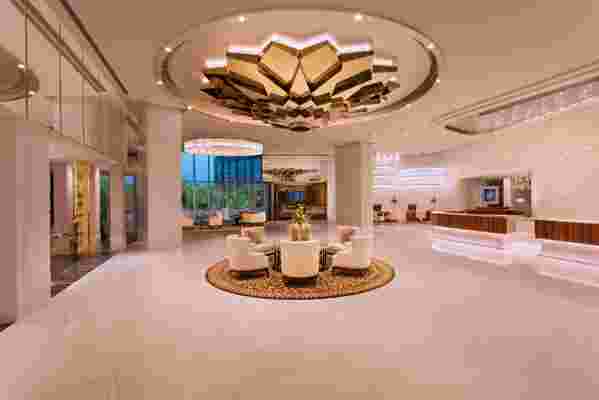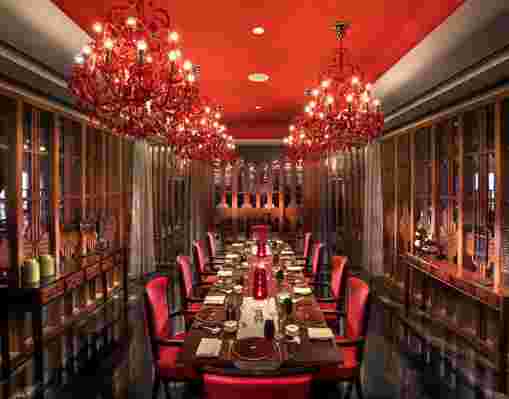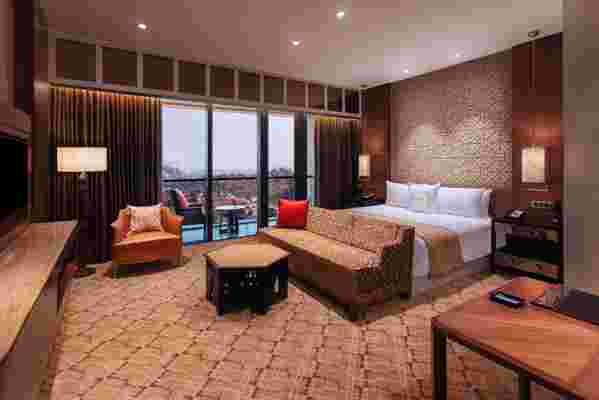The challenge to become eco-friendly has been the elephant in the room for luxury hotels for more than a decade. Nevertheless, slowly but surely, sustainable design has become a buzzword for five-star properties everywhere from Paris to Peru. But for one Indian hotel chain, sustainability isn’t just a concept thrown around in a boardroom—it’s become the core of the company’s operations.
ITC Hotels set an unprecedented benchmark when its 11 luxury hotels all became certified LEED Platinum, a process that included retrofitting nine properties. Today, the company is India's second-largest hotel chain, with more than 90 hotels throughout the country, and the only company in the world of its size to have been carbon positive for 13 years, water positive for 16 years, and solid waste recycling positive for 11 years—all in one of the world’s most polluted countries (according to the World Economic Forum, India has six of the ten most polluted cities in the world .
In May, the company opened its newest hotel in Hyderabad, ITC Kohenur, which uses high-tech green initiatives like 100 percent LED lighting, a green roof, and a unique building structure that captures maximum sunlight, but also guest-facing improvements like Vitamin C–infused showers and plants in every room to improve air quality.
These are just a few of the sustainable initiatives that ITC incorporates into its luxury hotels, according to Dipak Haksar, the company’s chief executive. AD sat down with Haksar to find out more about the company’s “Responsible Luxury” mission, the challenges ITC faces in India, and the future of sustainability and luxury travel.

An open layout of the all-new ITC Kohenur hotel in India.
Architectural Digest : When did ITC decide to completely embrace being eco-friendly?
Dipak Haksar In 2009, we were at the crossroads of adapting either sustainability or luxury as the way forward for the brand. Sustainable practices were embedded in our DNA, and curating luxury experiences formed part of the business that we were engaged in. It was then that we decided an approach that required the combining of two concepts. We decided that while the experiences that we would curate for our guests epitomized luxury, the back-end support to these experiences would follow the highest principles of responsible practices.
AD : What has been the single most difficult or challenging project across all of the hotels?
DH : Retrofitting old hotels—nine hotels in eleven months—to accomplish LEED platinum standards was no mean feat. There were many unknown territories to cover each day. There were processes and product barriers, but we overcame the challenges by applying unorthodox solutions. It was ultimately the belief and support of the entire team in the philosophy that led to all properties achieving LEED Platinum certification.
AD : How has ITC worked to educate the surrounding communities about their projects? What has the response been?
DH : Working with local communities is an integral aspect of how “Responsible Luxury” comes alive at our hotels. Having integrated ourselves into the fabric of the community, we ensure that we share our learnings and aid in working towards an ecosystem which is beneficial to all, whether it be local neighborhoods, schools, or municipal corporations. (More than 30 percent of the food and beverage served in ITC’s hotels is sourced from less than 100 miles away.)

A formal dining room in the all-new ITC Kohenur hotel.
AD : Have you seen other hotels in India following suit?
DH : The most important learning for us was how a concept like this could motivate people, both within and outside the organization. True luxury cannot stand alone—it must harness all elements of nature and benefit all stakeholders. While we may have been ahead of the curve, we believe that our ethos is a sign of the times.

A look inside the bedroom of the ITC Kohenur hotel in India.
AD : Do you think travelers are seeking out ITC because they have an interest in the company's commitment to the environment?
DH : The conscious consumer is looking to contribute by endorsing luxury brands that are eco-friendly. In the context of luxury hotels, it takes on the challenge of making luxury more meaningful with deeper roots in society and the environment.
A look inside the bathroom of the ITC Kohenur hotel.
AD : What do you think the future holds for sustainability and luxury?
DH : By 2030, the hospitality landscape will be unrecognizable compared to the standards of today, and sustainability will be one of the pervasive drivers of change. And those who fail to adhere to these changes in the industry find the risk of getting lost.
